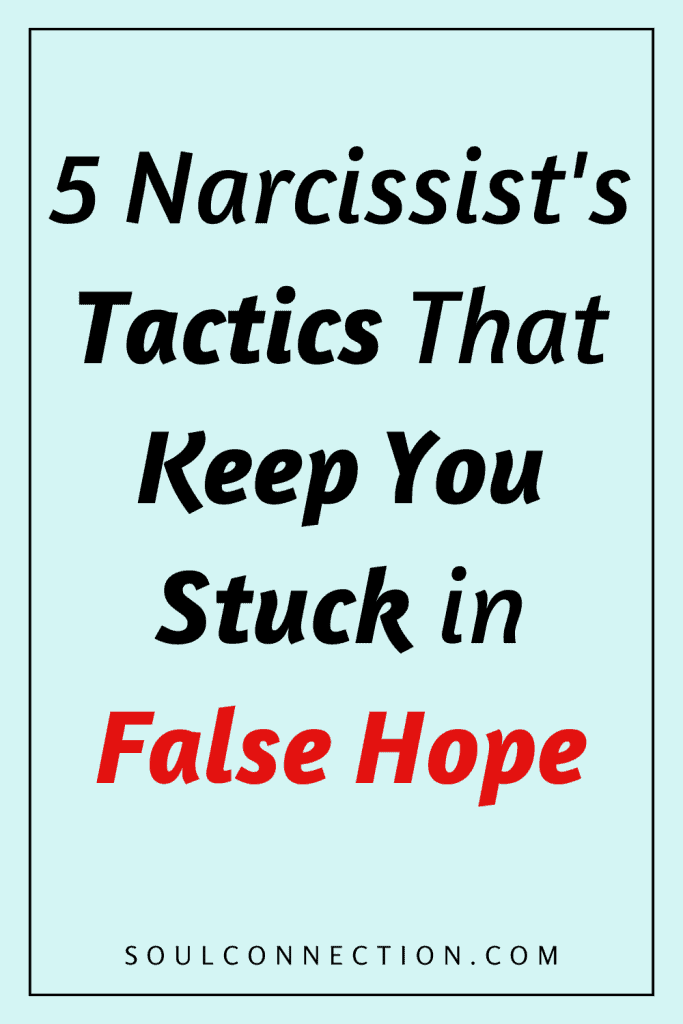Ever found yourself clinging to the fantasy that one day, your narcissistic partner will suddenly transform into the loving, selfless soulmate you deserve?
Maybe you picture them bursting through the door with a heartfelt apology, flowers in hand, prepared to go to couples’ therapy and binge-watch your favorite reality TV as penance. If so, congratulations: you’ve met the seductive power of false hope, narcissist-style.
Narcissists could teach a masterclass in stringing people along—if only they had the self-awareness (and, you know, the empathy).
They excel at making just enough promises, tossing just enough crumbs, and hitting you with just enough drama to keep you hanging on for the next episode.
Ready to spot the traps? Here are five narcissist tactics that keep even the savviest among us stuck in a never-ending cycle of hope.
1. Future Faking
When it comes to painting a dazzling picture of tomorrow, narcissists wield hope like a paint roller.
Plans for exotic holidays, wedding bells, a cottage in the woods, or “as soon as I get this promotion, everything will change”—these grand promises tend to flow faster than cheap wine at a wedding.
There’s just one tiny catch. The future never actually arrives. Months or years later, you’re still waiting for the magical day when they finally keep their word.
In the meantime, you’re left clinging to the idea that tomorrow will be the day they’ll finally show up as the person you fell for.
Why does this keep you stuck? Because every time you question the relationship, those shiny promises float back up in your mind. “Just a little longer,” you tell yourself. “They really mean it this time.”
The trick is to separate actions from words. Start tracking what your partner actually does, not what they say they’ll do.
If “our big trip to Paris” has been rescheduled more times than your dentist appointment, it’s time to take off the rose-colored glasses.
2. Love Bombing (With a Side of Amnesia)
Remember the early days, when you were showered with affection, attention, and maybe even a playlist of love songs that suspiciously resembled your teenage diary? That was no accident.
Love bombing is the narcissist’s opening move: intense praise, dramatic declarations, and enough charm to power a small city.
Then, without warning, the adoration vanishes. You’re left wondering where the loving, attentive person went, and you start chasing that feeling, convinced it will return if you just do the right thing. Spoiler: this is exactly what they want.
When you challenge them about the sudden switch, they’ll act as if your memory is playing tricks on you. “I’m the same as always,” they insist, as you start doubting your own reality.
Keep an eye on consistency. Anyone can play the romantic for a week or two. Real connection shows up in the everyday stuff—like listening to your work rants or helping you unearth your missing sock from the dryer.
3. Gaslighting
Ready for a trip down the rabbit hole? Gaslighting is a classic narcissist maneuver. It starts small—a casual denial here, a subtle shift in the story there.
Before long, you’re questioning your own memory, judgment, and even sanity.
Maybe you confront them about something hurtful, and they respond with, “You’re too sensitive” or “That never happened.”
Or perhaps they turn every disagreement into a convoluted crime scene where you emerge as the villain, guilty of some offense you can’t even recall.
The result: you’re constantly apologizing, doubting yourself, and searching for ways to “fix” things you didn’t break. It’s exhausting, and worst of all, it keeps you focused on proving yourself instead of recognizing what’s really going on.
Trust your gut. If you consistently feel confused, anxious, or like you’re paddling in circles, that’s not love—it’s manipulation.
Call in reinforcements. Chat with a friend, therapist, or your favorite bartender about what’s happening. Sometimes, you need an outside perspective to see the wood for the trees.
4. Playing the Victim Card
Narcissists are masters at flipping the script. One minute, you’re hurt by their behavior; the next, you’re comforting them for the pain you’ve supposedly caused.
They’ll recount their traumatic childhood, the unfair boss, or the long list of exes who “never really understood them.”
This technique tugs at your empathy, making it almost impossible to hold them accountable. Suddenly, your needs take a back seat to their endless crises.
And every rough patch becomes another excuse to postpone healthy boundaries or uncomfortable conversations.
It’s not that their pain isn’t real—sometimes, it is. But the question is: does it always become a get-out-of-jail-free card?
If your relationship feels more like a counseling session than a partnership, it’s time to re-evaluate who’s doing all the emotional heavy lifting.
Compassion matters, but it shouldn’t swallow you whole. If you’re always the one sacrificing, maybe it’s time to put the oxygen mask on yourself first.
5. Intermittent Reinforcement
Ever seen a gambler glued to a slot machine, convinced the next pull will hit the jackpot? That’s intermittent reinforcement at work—a psychological trick narcissists wield with alarming skill.
Most days, you’re left with crumbs: a kind word here, a compliment there, and plenty of cold shoulders in between. Then, when you’re about to give up, they throw you a bone.
Maybe it’s a rare date night, a genuinely sweet gesture, or a sudden burst of affection. Just enough to reel you back in and fire up the hope that things are finally changing.
This unpredictability keeps you hooked. Your brain starts chasing those fleeting moments of connection, convinced that if you hold on a little longer, the good times will return.
Consistency is the real litmus test. Love that keeps you guessing isn’t romantic—it’s emotional whiplash. Start keeping track: are the highs worth all the lows, or are you simply waiting for scraps?
Breaking Free from the False Hope Cycle
Recognizing these tactics doesn’t mean marching into the living room with a PowerPoint labeled “Your Manipulation, Slide 1.” (Though, admittedly, that would make for one memorable evening.)
The goal isn’t to diagnose your partner from afar, but to get honest about how their behavior makes you feel.
Ask yourself: Are you mostly anxious, tiptoeing around their moods, or endlessly waiting for change? Has your self-esteem taken a nosedive? Are you pouring energy into the relationship, only to find yourself running on empty?
Take a beat to reconnect with your own wants and needs, separate from the drama. Writing things down can help. Sometimes, seeing the pattern on paper is the reality check you need.
And don’t forget: support is out there. Trusted friends, therapists, online forums—they’re all waiting with open arms (and maybe snacks). No shame in reaching out.
Sometimes the bravest thing you can do is stop hoping for a miracle and start hoping for peace.
Nobody deserves to be benched on the sidelines, clutching onto empty promises.
Healthy love isn’t about surviving on crumbs or decoding cryptic behavior. It’s about feeling seen, valued, and safe—no decoder ring required.
Ready for a wild plot twist? The hope you’ve been waiting for doesn’t depend on anyone else’s script.
It starts with you, and it’s real.


